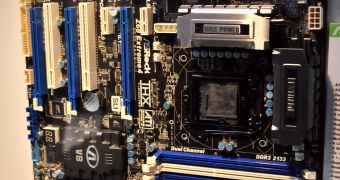Awaited by many users considering to build an Intel Sandy Bridge system, the Z68 Express chipset is slated to come in the first half of May and the very first preview of such a motherboard seems to confirm this is the chipset to get in order to fully unlock the potential of Intel's second generation Core processors.
The Z68 chipset comes as a hybrid between the P67 and the H67 and was designed as to allow for overclocking Sandy Bridge CPUs and the system's memory while using the processor's integrated graphics.
While this may not sound like such a great deal for users who want to use discrete graphics cards for their machine, going this route will enable them to employ the Quick Sync transcoding technology that is embedded into the Sandy Bridge core.
Just as our review of Intel's second generation Core CPUs had demonstrated, Quick Sync has a great impact on video transcoding times while also offering far better image quality that Nvidia's CUDA path, one of the most common methods used for accelerating such tasks.
To activate Quick Sync with a discrete graphics card, users are required to install a Lucidlogix Virtu driver, but as Tom's Hardware preview reports, the technology has no impact whatsoever on the performance of the system and everything seems to work pretty great with the latest version of the driver.
The other feature that makes the Z68 a better choice than the P67 is its SSD caching technology that speeds up the performance of the system when a limited capacity boot drive is paired together with an HDD.
This seems to work pretty well in practice and offers a tangible improvement over using just a hard disk drive, as Tom's Hardware has found out.
“If Quick Sync means nothing to you, and SSD caching doesn’t sound all that appealing, a P67 board is probably fine. But it bothers me to know I’m missing out on a feature to which I should have access.
“That’s what Z68 solves. Using a combination of Z68, a K-series CPU, your favorite discrete graphics card, and Virtu, all bases are covered, from overclocking to gaming and media transcode performance,” concludes the Z68 motherboard preview.
The first motherboards using the Z68 PCH are expected to make their appearance somewhere in the May 8th-14th timeframe.

 14 DAY TRIAL //
14 DAY TRIAL //